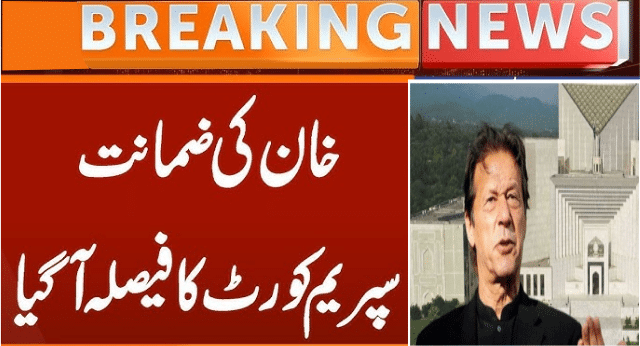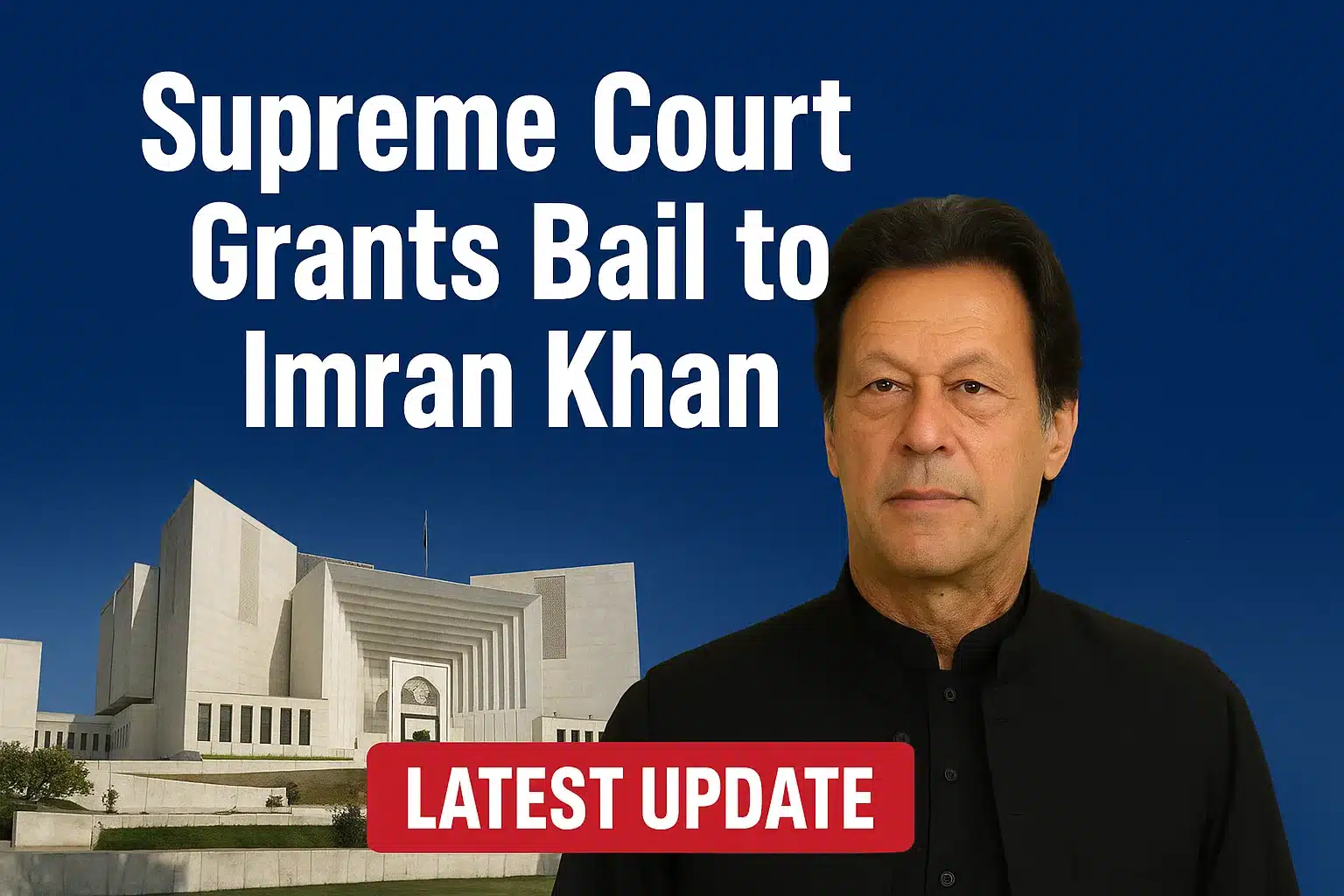Supreme Court grants bail to Imran Khan in a major decision. Read the latest update on legal proceedings, political impact, and what this ruling means.”
Islamabad: The Supreme Court of Pakistan has granted bail to PTI Chairman Imran Khan, marking a pivotal moment in the country’s ongoing legal and political developments. The decision, announced after extensive court proceedings, has been widely recognized as a significant relief for the former Prime Minister, who has been facing multiple legal cases across different forums. The court’s order allowing bail to Imran Khan comes at a time when the political climate in Pakistan remains highly sensitive, with ongoing legal challenges, parliamentary dynamics, and questions surrounding electoral reforms. Legal observers note that the ruling could carry far-reaching consequences, not only for Khan’s political career but also for the broader political and legal landscape of the country.
Supreme Court Grants Bail to Imran Khan – Background of the Case
Imran Khan, the chairman of Pakistan Tehreek-e-Insaf (PTI) and the country’s former Prime Minister, has faced several legal proceedings in recent years. These include cases related to allegations of corruption, political unrest, and procedural irregularities. The Supreme Court’s decision to grant bail came after weeks of hearings, during which Khan’s legal team presented detailed arguments defending his position and challenging the charges brought against him. Prosecutors, meanwhile, argued in favor of continued custody, citing the seriousness of the allegations. The court, however, after reviewing submissions and considering the available evidence, concluded that bail should be granted until the completion of trial proceedings. The detailed verdict is expected to provide additional legal reasoning for the decision.
Significance of the Supreme Court’s Decision
The approval of bail for Imran Khan by the Supreme Court of Pakistan holds considerable importance for several reasons:
- Political Impact: As the head of PTI, Khan remains a central figure in Pakistani politics. His release on bail enables him to re-engage with political activities, party organization, and policy debates.
- Legal Precedent: The decision reinforces the principle of due process, ensuring that political leaders, regardless of their status, are entitled to legal protections under Pakistan’s Constitution.
- Judicial Independence: The ruling has been closely watched by both domestic and international observers as a test of the independence of Pakistan’s judiciary.
Reactions to the Supreme Court Ruling
The Supreme Court’s decision triggered swift and varied responses across Pakistan: Supporters of Imran Khan welcomed the ruling, celebrating what they described as a fair and just outcome. Social media platforms such as Twitter (X), Facebook, and WhatsApp groups were filled with messages of support, trending hashtags, and public expressions of relief. Political rivals expressed concern, questioning whether the decision would affect ongoing accountability efforts. Some opposition voices argued that bail approval should not overshadow the need for legal accountability in corruption and governance-related cases. Civil society organizations observed the ruling with interest, emphasizing the importance of judicial transparency and equal treatment under the law.
Legal Experts’ Analysis
Prominent legal analysts have weighed in on the Supreme Court’s bail decision for Imran Khan. According to legal commentators, the court’s ruling demonstrates adherence to constitutional protections afforded to all citizens under Article 10-A of Pakistan’s Constitution, which guarantees the right to a fair trial. Experts further highlighted that bail does not amount to acquittal. Instead, it allows the accused to remain free while the trial process continues. The substantive determination of guilt or innocence will depend on evidence presented before the trial court. Additionally, legal experts point out that this development underscores the balance between state accountability measures and individual rights, a recurring theme in Pakistan’s constitutional and political history.
Broader Political Implications
The Supreme Court’s bail approval for Imran Khan could reshape the political environment in several ways: PTI, as the country’s largest political party in terms of electoral support, may use Khan’s bail as an opportunity to mobilize public support, strengthen organizational structures, and prepare for upcoming electoral contests. The ruling may influence relations between the judiciary, the executive, and political parties, particularly in matters of governance, law enforcement, and institutional accountability. With Khan continuing to enjoy a strong support base, public opinion is likely to play a crucial role in shaping the trajectory of political discourse in the months ahead.
Timeline of Recent Legal Proceedings Against Imran Khan
- Multiple Cases Filed: Over the past two years, Imran Khan has faced cases relating to alleged corruption, misuse of authority, and political demonstrations.
- High Court Interventions: Various High Courts have previously heard petitions involving Khan, some granting interim relief and others dismissing his appeals.
- Supreme Court Involvement: The Supreme Court’s role in granting bail has now provided a measure of legal clarity, while the underlying trials remain pending.
Impact on Upcoming Elections
Political observers are closely monitoring whether the Supreme Court’s decision will affect the timeline and dynamics of Pakistan’s general elections. If Khan remains free on bail, PTI may intensify its election campaigns, reasserting itself as a major electoral force. The ruling could also influence coalition strategies among rival political parties, particularly in constituencies where PTI has demonstrated strong support. Election regulators, including the Election Commission of Pakistan (ECP), may face increased scrutiny regarding their role in ensuring a fair and transparent process.
Role of the Judiciary in Pakistan’s Democracy
The Supreme Court’s bail ruling for Imran Khan once again highlights the judiciary’s critical role in Pakistan’s constitutional democracy. The court’s decisions not only affect individual cases but also set important precedents for governance, accountability, and rule of law. Judicial independence remains a cornerstone of democratic institutions, ensuring that all citizens, including political leaders, are subject to impartial adjudication.
International Reactions
Although direct official statements from foreign governments remain limited, international media outlets have covered the Supreme Court’s decision extensively. Coverage emphasizes the significance of Khan’s bail in the broader context of Pakistan’s political stability and governance challenges. Global human rights organizations have also underscored the importance of upholding fair trial standards and ensuring that legal processes remain free from political influence.
Social Media Trends and Public Discourse
The Supreme Court’s ruling quickly became one of the top trends on Twitter (X), with hashtags such as #ImranKhanBail and #SupremeCourtDecision gaining widespread traction. Digital platforms played a central role in shaping the public narrative, with supporters celebrating the decision as a legal victory and opponents questioning the broader implications for accountability.

Future Legal Proceedings
It is important to note that the granting of bail does not conclude the legal process against Imran Khan. Several cases remain pending in trial courts, and outcomes will depend on evidence, witnesses, and judicial evaluation. The Supreme Court’s decision provides temporary relief but does not preclude future convictions or acquittals. Both prosecution and defense teams are expected to continue presenting arguments in upcoming hearings.
Supreme Court Grants Bail to Imran Khan – Conclusion
The Supreme Court’s decision to grant bail to Imran Khan is a defining moment in Pakistan’s ongoing political and legal narrative. While the ruling provides temporary relief, it does not end the legal challenges Khan continues to face, as multiple cases remain under trial in various courts. The development carries wide-ranging implications for Pakistan’s politics, judiciary, and democratic process. For PTI, it represents an opportunity to re-energize its political base ahead of upcoming elections, while for the judiciary, it underscores the principle of fair trial and constitutional rights. As legal proceedings move forward, the case will remain central to national discourse, shaping both governance and public opinion in the months ahead.

